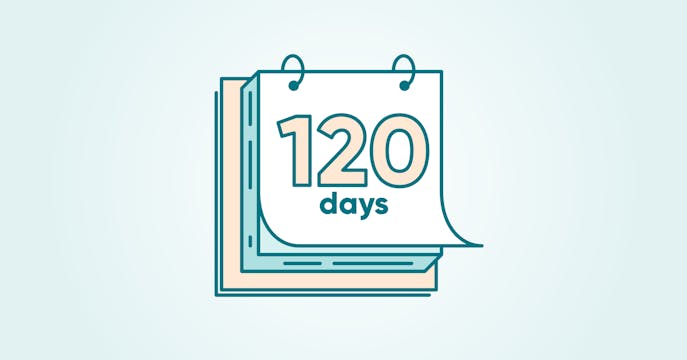Early Renewals
To protect your rate, or switch to a lower one, how early can you renew?
Breaking your mortgage early to get today's rate means you'll likely pay a penalty. But, it could be worth it — to save more cash down the road.
The early bird gets the ... rate savings? Sometimes, yes.
Rates change. If you currently hold a mortgage and you see rates going up, or if they've already come down — you may want to break your mortgage term early to get today's rate and save some cash. Depending on your lender and mortgage product, you'll likely pay penalties or fees, but you may come out ahead, depending on the rate you're paying now vs. the current rate you'll lock into.
What is an early renewal, exactly?
In this case, you're not waiting for your natural renewal period that starts 120 days before the end of your current mortgage term. You're ending your contract early in order to form a new one, usually with the same lender. But, this break may also be a good time to switch lenders for a better rate, take out extra funds (a refinance), or change to a more flexible mortgage.
During the early renewal process, your expert broker can always help you revisit your needs. That way, if your living or financial situation has changed, it's a chance to get all your mortgage ducks in a row.
How early can you renew?
Technically, you can break your mortgage anytime between the start of your contract and your natural renewal period (unless you signed up to certain restrictions, such as a bona-fide sale clause). If rates are climbing up or down, you might be chewing on your fingernails, wondering if now is the time to protect against further increases, or switch to a lower rate, instead of waiting for your renewal period to arrive.
So why wait, do you say? It depends on how much time you have left in your term, how much the early break will cost you, and if the rate difference makes it worth your while.
There are many early-renewal scenarios that can save you money on mortgage payments and interest costs, over and above the penalties or fees. Or, you may be better off standing pat and waiting for your renewal time. A highly-trained True North Mortgage broker can help you decide.
If rates are going up?
If rate-increases are in the air, take a look at what the current rate is now, and estimate where you think they may be in a few months, or even a year or two. If they end up going higher, locking into a current lower rate for a 5-year term will protect from any further hikes during that time, and may be worth the penalty cost. Whereas if you wait a year or so for your renewal period when rates are higher, you'll have no choice but to pay that rate — and if rates stay high, you won't be able to 'early renew' to a lower rate, either.
If rates are going down?
Paying a higher rate for your term when the current rate has lowered means that you're spending more on mortgage interest costs by comparison — which has implications for your monthly payments, principal pay down, and even amortization. If the rate difference is high enough to overcome the penalty payout — breaking your mortgage contract mid-term to switch to a lower rate may help you save thousands.
What charges could be involved?
Closed term agreement. Most Canadian home owners opt for this type of term because of lower rates offered compared to open terms, but there are penalties if you want to break your term early to:
- Renegotiate a rate, extend your amortization, or refinance for extra funds
- Switch to another lender for a better rate or mortgage options
Breaking your closed variable-rate mortgage typically incurs a penalty of 3-months interest. A fixed-rate mortgage break will cost the greater of 3-months interest or the IRD (Interest Rate Differential). There may also be other fees or higher penalties attached, depending on the lender and mortgage contract.
Open term agreement. Typically offered at a higher variable rate, there is no penalty to lock into a fixed rate, change lenders, or refinance.
What should you look for when watching rates?
A variable-rate mortgage is tied to fluctuations in the Bank of Canada's (BoC's) benchmark overnight lending rate. But, a lender's 'discount-off-prime-rate' is also a consideration, as it can change along with rate fluctuations or market pressures to affect your rate when you lock in or hold it for a pre-approval. For example, with a wide spread between variable and fixed rates, the variable-rate discount may be lowered to temper the cost-difference in funding your mortgage. If the discount-off-prime is higher, you'll keep that variable discount during your term to save more.
For a fixed-rate mortgage, rate changes can be anticipated by watching the government bond yield market. The higher the yield percentage, the higher fixed rates tend to notch up along with them. Keep up on the latest financial articles to 'read the room' for where bond yields may be going — or talk to an expert True North Mortgage broker for targeted advice.
Pay attention to the rate spread.
Variable rates tend to be at least a bit lower than fixed rates, because you'll have to deal with possible rate fluctuations and payment changes during your term. But if there's a wide spread between variable and fixed mortgage rates, you may want to renew early to take advantage of the savings. Many homeowners decide to take on the variable rate risk when the savings are higher.
Use our Compare & Save Calculator to visualize your rate savings.
Take our Compare & Save Calculator for a spin to see the savings between a higher and lower rate, then talk to an expert True North Mortgage broker. They can zero in on your exact mortgage fine print to help you calculate your pre-payment penalty or other fees your lender may charge for an early renewal. You can also try to estimate your penalties, read here for more information.
Renewing early may take the sting out.
We can help you decide if it's right for you.
Our expert True North Mortgage brokers can quickly help you outline the numbers to find the right savings-scenario for your situation.
Your mortgage is likely the largest financial commitment you have, so saving a few thousand dollars with an early renewal may make a big difference for your goals.
We're always here to help, anywhere you are in Canada.
Our friendly, expert brokers can help in your preferred language — online, over the phone or at one of our store locations.
Let's run the numbers for your best renewal strategy.
Your better mortgage is all we know how to do

5-Star Reviews
We care, and it shows — we now have over 15,000 5-star client reviews.
Learn More
Watch Out For Mortgage Traps
Is your spidey-sense tingling? Watch out! That bargain-bin rate may cost you more later.
Learn More
Mortgage Renewal Reminder
Renewal time already? That was fast. Get a reminder to save a pile of cash.
Learn More